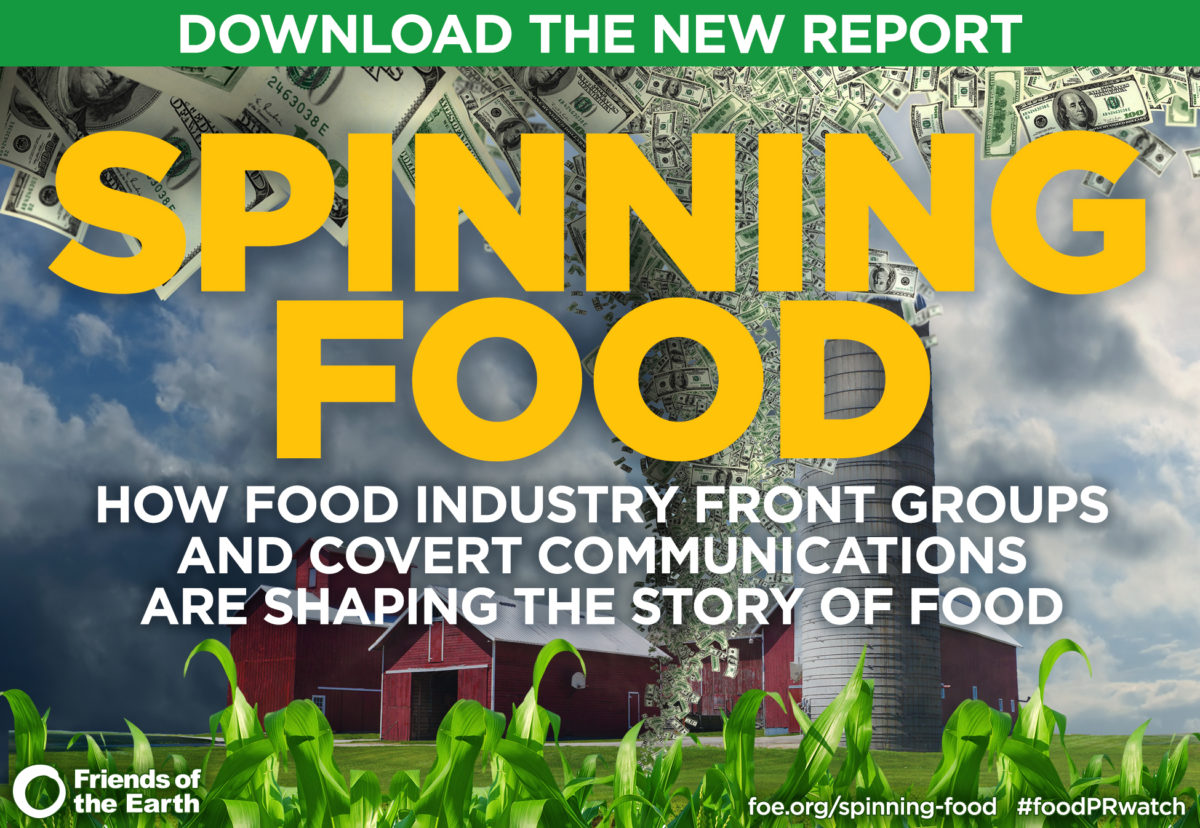
Truth or deception? New report exposes how industry front groups are spending millions to shape the story of food
Organic and non-GMO food sales are skyrocketing as more and more people are choosing healthier, more sustainable food produced without synthetic pesticides, GMOs or the routine use of antibiotics and added hormones. Rather than respond to changing market demands by shifting the way they do business, many large food and agrochemical companies are using tobacco-style PR tactics to mislead the public and attack the organic food industry to try to win back skeptical consumers.
Our new report, “Spinning food,” investigates how Big Food and agrochemical corporations are deliberately misleading the public — and reporters — on facts about industrial agriculture and organic and sustainable food production.
Taking their cues from the tobacco industry, these companies have spent hundreds of millions of dollars in the past few years on stealth PR tactics, deploying over a dozen front groups to push coordinated messages attacking organic food production, defending pesticides and the routine use of antibiotics and promoting GMOs — messages that are making their way into the pages of our largest media outlets. In the last four years alone, these companies have set up six new front groups that often appear as independent experts in the media, but are in fact made up of industry or PR professionals that are promoting messages designed to defend industry profits and win critical national policy battles on these issues.
The report shows how these companies are trying to preserve their markets by deploying front groups; targeting moms, attacking journalists and scientists; grooming third party allies that pose as independent sources; producing advertising disguised as editorial content and using other covert tactics to influence public opinion and sway policymakers — without most people realizing the story is being shaped behind the scenes to promote corporate interests. With the future of our food at stake, it is critical to raise awareness about these coordinated messages and covert communication tactics.
While the food industry’s use of public relations to shape public opinion and policy making is not new, the level of spending, the increase in the use of front groups and the deployment of covert social media tactics is unprecedented.
Our aim with this report is to shed light on how the industrial food and agriculture sector is trying to defuse concerns about the real risks of chemical-intensive industrial agriculture and undermine public confidence in the benefits of organic food and diversified, ecological production systems. We hope this report helps reporters, policymakers, opinion leaders and the public bring increased scrutiny to the food industry’s messages and messengers.
Although advocates and educated consumers — backed by powerful new research on the benefits of organic food and farming and the risks of chemical-intensive agriculture — are pushing back against this propaganda, they lack the vast financial resources of industry. Left unchecked, the recent growth in industry-sponsored spin could succeed in misleading consumers and policy makers reducing demand for and access to safe, sustainable and organic food. In order to advance the policies needed to reform industrial food production and build a healthy food system for all, we need the real story, not spin. By revealing key groups and tactics used by industry, we hope this report helps support more fair and accurate reporting on our food system.
Read the report, and what journalists, the public and public interest advocates can do about it here:
- Download the PDF of report, the executive summary and the conclusions and recommendations
- Read news release
- See chart of top front groups
Sign up with Friends of the Earth to keep up to date on reports like this and how you can be involved.
Related Posts
Ways to Support Our Work

Read Latest News
Stay informed and inspired. Read our latest press releases to see how we’re making a difference for the planet.

See Our Impact
See the real wins your support made possible. Read about the campaign wins we’ve fought for and won together.

Donate Today
Help power change. It takes support from environmental champions like you to build a more healthy and just world.